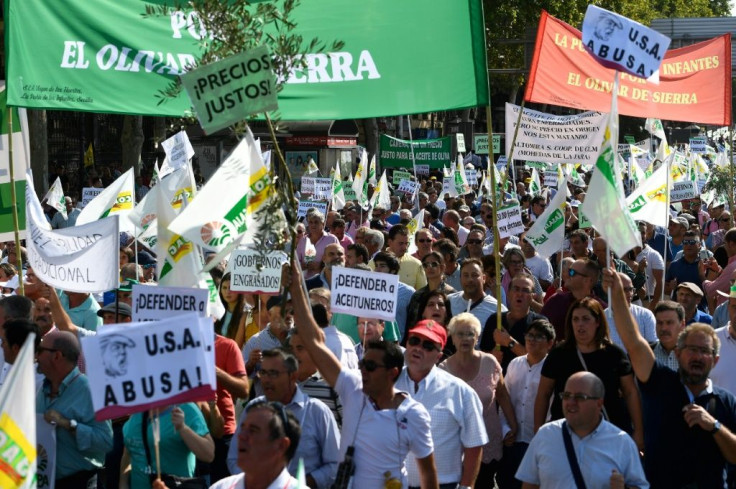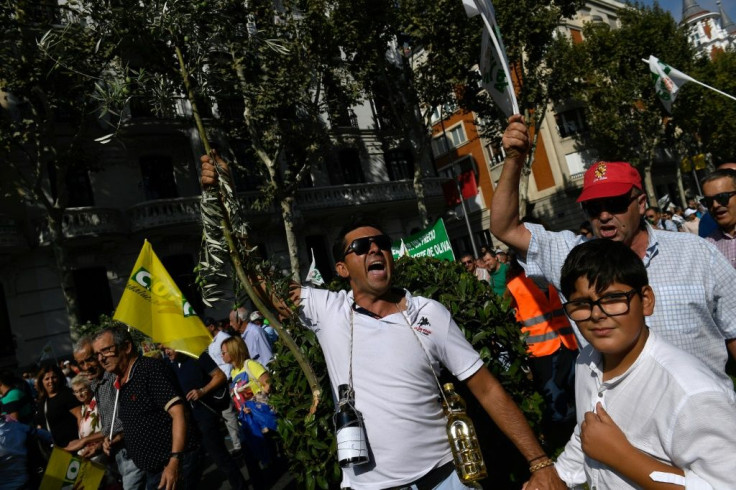Trump Puts Squeeze On Spanish Olive Oil Producers

Farmers had just begun harvesting olives in southern Spain when US President Donald Trump soured the mood with the announcement that Washington would slap hefty tariffs on their produce.
"We are really worried," said Carlos Carreira at his 130 hectare (320 acre) olive grove near the town of Antequera in the southern region of Andalusia.
Spain is the world's biggest producer of olive oil, and the bulk of it comes from Andalusia, whose hills and plains are dotted with olive trees with their distinctive gnarled trunks.
"Already last year prices were sometimes so low that they did not cover production costs. If we add to this a sharp rise in the price of our products in the United States, many farms may end up not being viable," Carreira added.
Several thousand olive growers, many waving olive branches marched through Madrid on Thursday to protest plunging prices and demand protection from a 25 percent tax which the US is planning to impose from October 18.
The fresh tariffs announced October 2 target some EU agricultural and industrial products -- including Spanish olives and olive oil -- worth $7.5 billion (6.8 billion euros).
The tariffs are in retaliation for subsidies given by Brussels to aircraft maker Airbus.
Olives and olive oil are Spain's main agricultural exports to the United States. It exported 405 million euros worth of olive oil, and 179 million euros worth of olives, to the country last year.
At Carreira's farm, a dozen day labourers used machines to shake the olive trees, causing the fruit to fall onto long nets.
Still bright green, they will be sold as table olives. Olive oil production will begin a few weeks later when riper olives will be collected.
'Tripped'
But some of this "liquid gold", which sustains entire villages, risks going unsold this year because of the tariffs.
Dcoop, the cooperative which Carreira belongs to and whose headquarters sit at the entrance to Antequera, exports nearly 15 percent of its output to the US, around 35,000 tonnes a year.

The cooperative, which groups 75,000 farmers, is a heavyweight in the sector. In some years it produces more olive oil than all of Italy.
Dcoop views the US market as a growth area, estimating olive oil consumption there could double in less than a decade.
It invested $80 million in the US, mostly in two bottling plants in Baltimore and Los Angeles.
"All of a sudden, the market we believed in and tried to grow imposes these tariffs on us. It's like we are being tripped in the middle of a race," said Dcoop president Antonio Luque.
He said the injustice is all the greater since Spain's main European competitors like Italy, Greece and Portugal have been spared tariffs on their olives, and will certainly use this advantage to boost their market share in the US.
Job cuts
The cooperative will probably have to slash its workforce by 10 percent at its main bottling plant in Andalusia.
These jobs could reappear in the US since the Trump administration has exempted bulk olive oil from the tariffs, meaning that Spanish firms could get around the levy by bottling their oil on the other side of the Atlantic.
Dcoop has not ruled out expanding its US plants, even if it would be "bad for jobs in Spain", Luque said.
Olive farmers in Andalusia are still reeling from heavy tariffs slapped by the US on black table olives in response to complaints from Californian producers who argued their Spanish rivals had an unfair advantage because of the European Union's lavish farm subsidy scheme.
Exports of black olives from Spain to the US fell by 50 percent.
Spanish farmers accuse Spain's Socialist government of doing nothing to protect them.
Luque warned that support for the EU could decline as a result of the differing tariff advantages.
"Why stay in the European Union if things are like that in the future? All this could do so much more harm, socially, than people imagine," he said.
© Copyright AFP 2024. All rights reserved.





















